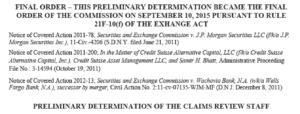Information Derived From A Complaint That Was Filed In Court By Someone Else Results In An SEC Whistleblower Award Disqualification
An individual put in award claims in three separate actions against three different investment banks. The SEC’s Claims Review Staff (“CRS”) reviewed the three claims together. In its Preliminary Determination, the CRS denied the individual any award for all three cases. One of the reasons given in the CRS’s Preliminary Determination for denying any award was that information contained in a court complaint that is filed by someone else is not “original information” and is therefore subject to an SEC whistleblower award disqualification. The Preliminary Determination was subsequently converted into a Final Order of the Commission.
The Commission’s Final Order
The Reasoning Behind The SEC Whistleblower Award Disqualification
Among other things, the Preliminary Determination states that the information that the claimant provided was derived from allegations made in a separate judicial complaint that was filed in a court “by another party.” In addition, according to the CRS, information in a court complaint is considered to be “derived from publicly available sources”. There might have been an exception made to the SEC whistleblower award disqualification if the claimant had been an original source of the information contained in the court complaint, but that did not appear to be the case.Information Derived From a Judicial Hearing
In explaining its decision, the CRS said that the claimant’s information “did not qualify as original information” under SEC whistleblower rule 21F-4(b)(1). Rule 21F-4(b) has the title “Original information.” Among other things, subsection (iii) of that rule states that a whistleblower’s submission cannot be “exclusively derived from an allegation made in a judicial or administrative hearing … unless you are a source of the information…” Therefore, the claimant’s information was subject to an SEC whistleblower award disqualification because it was not “original information” as defined by the SEC rules.Independent Knowledge & Publicly Available Sources
In a footnote, the Preliminary Determination also cited to Rule 21F-4(b)(2). That subsection is titled “Independent knowledge”. According to that rule, “independent knowledge” means:… factual information in your possession that is not derived from publicly available sources. You may gain independent knowledge from your experiences, communications and observations in your business or social interactions.
Additional Information
For additional information about this SEC whistleblower award disqualification, click on the link below:- The SEC’s September 10, 2015 Final Order. (External link to the SEC’s website.)







